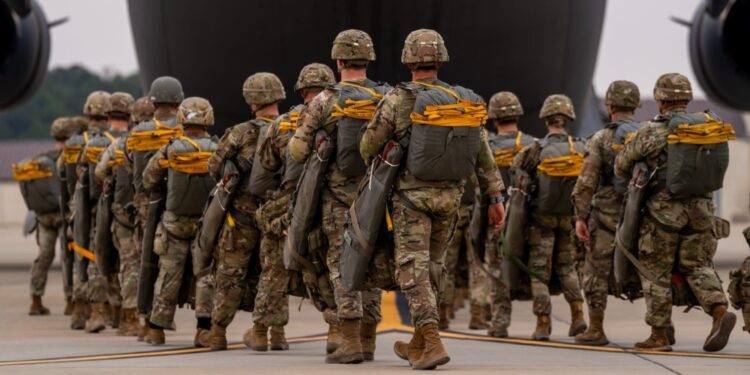Throughout history, warfare and military service have not been confined by the rigid lines of nationality. From mercenary companies of medieval Europe to modern foreign legions, armies have long relied on outsiders to strengthen their ranks. In the 21st century, the practice of foreigners serving in state militaries continues – not as an anomaly, but as a strategic necessity or cultural tradition.
Some nations enlist foreigners to address manpower shortages. Others embrace the practice as part of their military identity. A number of countries even use it as a tool of diplomacy, forging stronger ties with diaspora communities or allied states. For many individuals, military service becomes more than a job; it is a gateway to citizenship, stability, and belonging.
Why do countries recruit foreigners?
Allowing non-nationals to serve in a country’s armed forces may appear unusual at first glance, yet it is grounded in both necessity and tradition. The motivations generally fall into several categories:
- Historical tradition: Armies such as the French Foreign Legion or Britain’s Gurkhas are built on legacies that date back centuries. Their continuation is as much symbolic as it is practical.
- Manpower shortfalls: Countries with small populations or high security demands often cannot meet recruitment goals with citizens alone. Accepting foreigners helps fill this gap.
- Diaspora connections: Nations with large expatriate communities often allow those with ancestral or cultural ties to enlist, strengthening identity across borders.
- Citizenship incentives: Some states provide pathways to residency or expedited naturalization in exchange for service, making the military a powerful immigration tool.
- Specialized skills: In a modern context, foreign recruits may be sought for their linguistic expertise, medical knowledge, or technical abilities vital to national security.
Historical precedents
The phenomenon is far from new. Several historical precedents illustrate how deeply rooted foreign recruitment has been in global military practice:
- Roman auxiliaries: Non-Roman citizens fought for the empire in exchange for land grants and eventual citizenship.
- Swiss mercenaries: Renowned for discipline, they served in European courts and remain symbolically present in the Vatican’s Swiss Guard today.
- Ottoman janissaries: Recruited from Christian populations, they became an elite military force within the empire.
- Colonial regiments: European empires routinely enlisted colonial subjects, a practice that evolved into today’s Commonwealth recruitment policies.
These examples demonstrate that foreign military service is not a modern innovation but a recurring feature of global defense systems.
Countries allowing foreign enlistment
Some of the countries that have made provisions – either formally or informally – for foreigners to enlist in their armed forces.
1. France: The Legendary Foreign Legion
Founded in 1831, the French Foreign Legion remains the archetype of foreign enlistment. Known for its strict discipline and esprit de corps, the Legion accepts applicants from nearly every nation. Recruits may even adopt new identities, offering anonymity for those seeking a fresh start.
- Eligibility: Open to men aged 17–39 of any nationality.
- Path to citizenship: After three years of service – or earlier if wounded in combat – legionnaires can apply for French nationality.
- Significance: Beyond its military role, the Legion symbolizes France’s ability to project power abroad while incorporating diverse backgrounds into a unified force.
2. United States: Conditional opportunities
The U.S. Armed Forces primarily enlist citizens and lawful permanent residents (green card holders). However, historically, programs like the MAVNI initiative (Military Accessions Vital to the National Interest) allowed foreigners with specialized language or medical skills to join.
- Eligibility: Permanent residents may enlist; undocumented migrants generally cannot.
- Citizenship benefits: Military service can fast-track naturalization, with thousands of service members gaining citizenship each year.
- Challenges: Policy changes and security vetting have made foreign enlistment more limited than in the past, though demand for skilled recruits persists.
3. United Kingdom: Commonwealth forces
The UK maintains a long tradition of recruiting from the Commonwealth of Nations, reflecting its imperial history. Citizens of countries like Fiji, Nepal, and Jamaica are eligible to enlist, often bringing with them unique regimental identities.
- Gurkhas: Perhaps the most famous foreign regiment, Gurkhas from Nepal have served the British Crown since 1815.
- Eligibility: Citizens of Commonwealth nations can apply directly, even without UK residency.
- Pathway: Many soldiers gain the right to settle in the UK after service, making it a route to permanent residency and citizenship.
4. Russia: Military service and citizenship
In recent years, Russia has expanded opportunities for foreigners to join its armed forces. Many recruits come from former Soviet republics, though contracts are also open to other nationalities.
- Eligibility: Applicants must be aged 18–30, speak Russian, and sign a minimum one-year contract.
- Citizenship benefits: Military service can accelerate the naturalization process, sometimes reducing waiting periods from years to months.
- Context: Russia’s policy reflects both demographic challenges and the strategic need to reinforce its military during ongoing conflicts.
5. Spain: Cultural and linguistic links
Spain allows nationals from Latin America, the Philippines, Andorra, and Equatorial Guinea to enlist, citing shared cultural and historical ties.
- Eligibility: Applicants must be between 18-29 years old and come from eligible countries.
- Integration: Service often leads to permanent residency and potential citizenship.
- Significance: The policy underscores Spain’s ongoing relationship with its former colonies, blending heritage with practical manpower needs.
Ethical and legal considerations
While foreign enlistment offers opportunities, it also raises questions:
- Loyalty: Can a foreign recruit be equally committed to defending a state they were not born into?
- Integration: How do diverse recruits adapt to cultural and institutional norms within the military?
- Exploitation risks: Are vulnerable migrants pushed into dangerous service in exchange for legal status?
- International law: Unlike mercenary activity, service in a national military is legal, but international conventions distinguish between the two.
Governments must balance these ethical dimensions with their strategic and demographic needs.
The future of foreign recruitment
As globalization continues, foreign enlistment is likely to grow more significant:
- Migration and demographics: Countries facing aging populations may increasingly rely on immigrant recruits.
- Specialized warfare: Cybersecurity, linguistics, and intelligence roles may draw more foreign expertise.
- Geopolitical shifts: Alliances and military coalitions could expand transnational recruitment further, blurring the line between national and global defense.
Conclusion
From the battlefields of the Roman Empire to the modern ranks of the French Foreign Legion, foreigners have long shaped the character and capability of national militaries. Today, some countries continue this practice, driven by a mixture of tradition, necessity, and opportunity. For the recruits, the military can be more than a career – it is often a path to legal recognition, belonging, and identity in a new homeland.
For the states, it is a pragmatic way to secure manpower, expertise, and enduring loyalty from those who choose to serve. In a world defined by mobility and interconnectedness, the soldier’s oath of allegiance increasingly transcends borders, reaffirming that the defense of a nation can sometimes be entrusted to those who were once outsiders.


































































































































































































